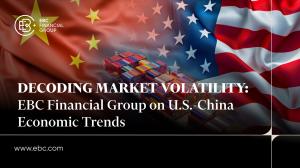A Defining Global Shift: U.S.-China trade developments are redefining global markets—EBC unpacks the trends, market movements, and investor outlook.
DC, UNITED STATES, February 21, 2025 /EINPresswire.com/ -- The latest developments between the United States and China mark a defining moment for global financial markets. As trade tensions reignite, China fortifies its economy against external pressures while the U.S. recalibrates its policies on tariffs and foreign
investment. These geopolitical shifts are altering capital flows and intensifying market volatility, prompting traders to reassess their strategies.Financial markets are experiencing heightened uncertainty as shifting trade policies and capital realignments drive volatility across commodities, forex, and stock indices. Market participants are tracking these developments to assess potential impacts on market movements. EBC Financial Group (EBC) has observed a growing demand for safe-haven assets and hedging strategies as traders assess the risks and opportunities ahead.
The Trade War Resurfaces: Market Jitters and Safe-Haven Demand
China’s latest round of measured yet strategic retaliatory tariffs signal a careful balancing act—responding firmly to U.S. trade measures while avoiding excessive market disruption. Investor sentiment remains fragile, as evidenced by recent market reactions.
According to a recent Reuters report, gold prices surged to record highs following the latest U.S.-China tariff announcements, with spot gold reaching USD2,942.70 per ounce. The report highlights how trade war concerns continue to drive demand for safe-haven assets like gold and silver. Meanwhile, the forex market is experiencing heightened fluctuations in USD/CNY, with the yuan recently reaching a three-week low against the dollar amid global trade uncertainty. Traders are closely monitoring China’s capital control measures and policy shifts to assess potential devaluation risks.
China’s Economic Fortress: A Shift in Global Capital Flows
China’s strategic move toward economic self-reliance and alternative trade partnerships signals a critical shift in the global investment landscape. In 2013 China rolled out their Belt and Road Initiative (BRI) that already has built ocean and inland water ports, rail ports, and transcontinental rail systems that link 150 countries that are home to two-thirds of the world’s population. And RCEP signed in 2020 is the first free trade agreement among the largest economies in Asia These initiatives are part of Beijing’s broader effort to secure long-term financial resilience and reduce dependence on Western markets. As China reduces reliance on U.S. markets, precious metals may have more room to run.
Market Ripples: How Trade Policies Are Reshaping Key Asset Classes
The U.S. recently imposed a broad 10% tariff on all Chinese imports, prompting Beijing to respond with 10%-15% duties on U.S. crude oil, liquefied natural gas (LNG), agricultural machinery, and other products. These measures, coupled with a 25% U.S. tariff on steel and aluminium, have escalated trade tensions and raised concerns over global supply chains.
In a recent interview with CGTN America, David Barrett, CEO of EBC Financial Group (UK) Ltd., spoke about the broader implications of U.S. trade policies. "If you are thinking about disrupting, bearing in mind that the U.S. has a massive deficit in terms of goods and a surplus in terms of services, it’s a pretty efficient way for the EU to go about it.”
While Barrett was referring to U.S.-EU trade relations, his insights reflect a broader trend—how key economic blocs are recalibrating their trade policies in response to U.S. tariff strategies. The same strategic realignment is unfolding in U.S.-China relations, with China responding through targeted countermeasures and alternative trade partnerships.
Additionally, China has tightened export restrictions on critical minerals essential for semiconductor and high-tech manufacturing. This strategic move not only pressures key U.S. industries but also impacts global technology supply chains, potentially affecting industrial metal prices and manufacturing costs.
EBC analysts note that these trade policies are weighing on market sentiment. Crude oil and commodity traders are closely watching these developments, particularly how a simmering trade war will dampen global growth outlook. Meanwhile, the latest U.S. tariffs have heightened risks for risky assets, increasing uncertainty over inflation.
For forex traders, emerging market currencies could experience increased volatility as capital flows adjust to the evolving U.S.-China trade landscape. The USD/CNY exchange rate remains a key indicator of global risk sentiment, reflecting market reactions to ongoing policy changes.
The Next Chapter: Markets Brace for a New U.S.-China Reality
US trade with China peaked in 2022 as a result of Trump’s protectionist policies in his first term. The decoupling will only accelerate with his return to the White House.
Global stocks are facing increased turbulence as trade tensions escalate. Traders are watching closely for signals on policy adjustments that could either escalate or de-escalate tensions, influencing sentiment across sectors.
Staying Ahead in a Transforming Financial Landscape
With the U.S.-China relationship entering a new phase of economic and financial realignment, market participants must stay agile—seeking opportunities while mitigating risks in a trading environment that is increasingly shaped by geopolitical forces. EBC Financial Group remains at the forefront of these developments, providing traders and investors with an exceptional trading environment to navigate evolving economic conditions. Discover more at https://www.ebc.com/.


No comments:
Post a Comment